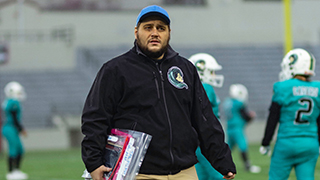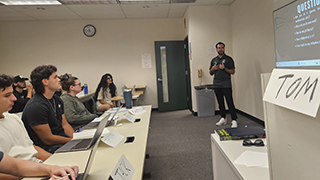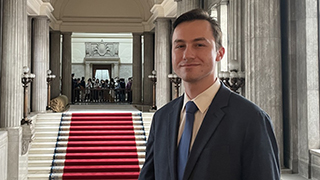Learning Beyond the Textbook: Seton Hall’s Sport and Exercise Psychology Program Brings Students Face-to-Face With Leading Experts
Monday, September 15, 2025

Professor of CPSY 8541 Thomas Andriani
Seton Hall’s Master’s Program in Psychological Studies offers students both academic rigor and practical experience. The program is housed under the College of Human Development, Culture, and Media. Within this Master’s program, the Psychology of Sport and Exercise concentration extends that practical focus into the performance arena. Here "CPSY 8541: Case Studies & Interventions in Sport Psychology" serves as a field-ready bridge between theory and the arena. This graduate course is taught by Adjunct Professor Thomas Andriani; his applied background in collegiate sports, professional sports and the U.S. Army informs an exciting semester, designed around live problem-solving and immediate feedback.
This year Andriani is excited about the guest speakers. Experts and practitioners visit first, followed by case study performers so students can test their own skills with real clients in real time. The expert lineup features Eugene Wentworth, mental performance coach for Gotham Football Club, a New York and New Jersey women’s soccer team; Sean Hall, founder of Sean Hall Coaching and Consulting, with a niche in tutoring centers; Kelli Kehoe, well-being unit manager for the New Hanover County Sheriff's Office; Mary Wood, Ph.D., cognitive performance specialist for the U.S. Air Force; and Joseph Galasso, PsyD, LPC, LCSW, of Baker Street Behavioral Health, who brings experience with many well-known sports teams such as the New Jersey Devils and New York Gridlock. As Andriani tells his class, “Don’t look at this as a 16-week course, look at it as 16 mini conferences.”
The class operates much like the environments its graduates will enter. “The bulk of my grading is presentations,” Andriani tells students. “If you want to coach or do public-facing work, you could be great at exams, you could be great at papers, but you can’t actually do the job unless you’re a competent public speaker.” He removes guesswork by including an explicit rubric in the syllabus and, early in the term, an elevator-pitch assignment that asks, as he puts it, “Why should I listen to you? Why should I work with you?” This exercise was designed to push students to explain their professional identity and values in a clear and persuasive way. It also prepares them for situations like job interviews, client consultations and leadership roles.
Andriani’s approach was forged in the Army, where he served as a Master Resilience Trainer and Performance Expert under the Army Resilience Directorate. He later added credentials as an Academic Performance Trainer and as a Suicide Intervention Master Trainer. During his service, he authored the Sleep Enhancement curriculum for the Army G1, Office of Deputy Chief of Staff; was embedded with two Air Defense Artillery batteries and a Signal Headquarters Company; and assisted with a presentation on embedded performance at the U.S. Army Aeromedical Research Laboratory. Before his military service, Andriani was a master’s student in the Psychological Studies Program at Seton Hall University, where he now teaches.
Andriani also brings resilience training, mindfulness, and practical drills. He may use mislabeled scent candles to sharpen focus, or LEGO relays to build team strategy. He introduces resets like “cognitive unloading,” asking players to release frustration so they can return to play with focus, reminding them to “control what you can control.”
His experience includes earning multiple coaching awards, presenting at the USA Lacrosse Convention and Exos Summit, and contributing to championship seasons. Whether with soldiers, students or athletes, his approach is consistent: listen closely and translate evidence-based tools into practices that teams can apply right away.

Guest speaker Eugene Wentworth, mental performance coach for Gotham Football Club
In his class, students can expect to study, but also to move. “There are a couple days we are going to do some of the exercises, you are going to sweat a little bit,” Andriani says. “Be ready to learn beyond the textbook. I am teaching the gaps that are not covered in books.”
For prospective students, the message is both an invitation and an opportunity. The Master’s Program in Psychological Studies requires 36 credits, with 12 credits in the Sport and Exercise Psychology concentration. The program attracts current and former athletes from all kinds of sports such as ice skating, football, soccer and basketball, as well as aspiring mental health professionals who want to serve performers and teams.
In addition to the concentration, the department offers a 15-credit Certificate in Sport and Exercise Psychology for professionals who want targeted expertise.
Categories: Athletics, Education, Health and Medicine






